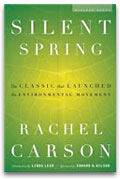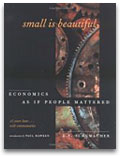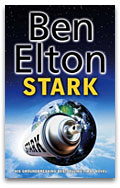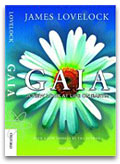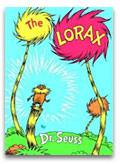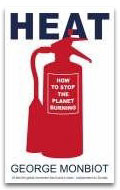Peter Madden, chief executive of Forum for the Future, writes a monthly column for Gristmill on sustainability in the U.K. and Europe.
What are the most important environmental books? At Forum for the Future, we polled 100 staff and colleagues from around the U.K. for the green books that had most influenced us, and came up with our top 10. The list spans the last 50 years, and contains the usual suspects — as well as a few surprises.
Small Is Beautiful and Silent Spring are the runaway winners, and the top 10 also contains one novel, one children’s book, and one autobiography. While a couple of titles on the list are peculiarly British, others have had a global impact.
It’s interesting to see what didn’t get the votes. There are no wildlife or wilderness classics, and no overt spirituality. Would that be different if this were an American list, I wonder?
And there’s no place for a number of classic reference texts — no Limits to Growth, Our Common Future, or State of the World. This might have something to do with the fact that great sources of information are not always the most riveting of reads.
Here’s the top 10 in full:
The Brit List
Small Is Beautiful (1973), by E.F. Schumacher
Silent Spring (1962), by Rachel Carson
Gaia (1979), James Lovelock
Factor Four (1995), by Amory Lovins, Hunter Lovins, and Ernst von Weizsäcker
Stark (1993), by Ben Elton
The Web of Life (1996), by Fritjof Capra
My Family and Other Animals (1956), by Gerald Durrell
For the Common Good (1989), by Herman Daly and John Cobb
The Lorax (1971), by Dr. Seuss
The Politics of the Real World (1996), by Michael Jacobs.
Even though most of our staff were not born when Schumacher and Carson launched their books on the world, these easily took first and second place. (I suspect, though, that a few more people voted for these books than actually read them.)
Professor James Lovelock’s outlining of his Gaia hypothesis — the idea that Earth itself acts like a single organism — is still popular, despite the author’s recent eco-fatalism and backing for nuclear power.
Strangely, only one novel made the list, and this was a surprising choice: Ben Elton’s blockbuster Stark, about a group of ultra-rich who seek to save themselves while the planet collapses. Elton, a stand-up comic and author, wrote a series of satirical novels in the 1990s, many with an environmental flavor, all with a distinctly “modern British” sense of humor.
There was also just one autobiography — My Family and Other Animals, by one of our great naturalists, Gerald Durrell. His account of growing up in Corfu, Greece, in the 1940s, is enduringly popular.
There were a few children’s books mentioned by our voters. The Lorax, Dr. Seuss’s superb and subversive eco-parable, made the chart at No. 9. Others which didn’t make the top 10 included Tarka the Otter by Henry Williamson, The Story of Ferdinand by Munro Leaf, and A.A. Milne’s Winnie the Pooh.
The most recently published books to make the list are from the mid-1990s. Factor Four will be familiar to many Grist readers. Capra’s work on systems thinking is also internationally known. Less well known outside the U.K. is The Politics of the Real World, produced for a broad coalition of NGOs. Author Michael Jacobs did an excellent job of joining up the arguments for sustainable development.
There was a slew of other books from recent years that got some mentions, but did not quite make the top 10. U.K. titles included Jonathon Porritt’s Capitalism as if the World Matters, George Monbiot’s Heat, and Change the World for a Fiver by a group of community activists called We Are What We Do. (A fiver is slang for a five pound note, worth around $10). Recent books from the U.S. that won some votes include Al Gore’s An Inconvenient Truth and Stuart Hart’s Capitalism at the Crossroads.
Overall, the list is very Anglo-American. This is due, in part, to some common intellectual traditions, but also reflects the fact that we British are lazy when it comes to speaking or reading anything but English. What is more disappointing is the absence of any books from the developing world.
So, did we get it right? How does the British top 10 measure up to your choices?

